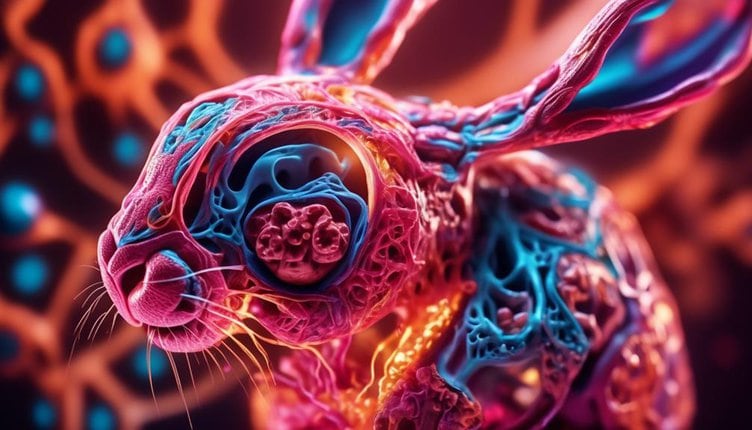Discover the Hidden Danger: Uterine Cancer in Female Rabbits
Did you know that uterine cancer affects a staggering 60% of female rabbits over the age of five? It's a startling statistic, but there's no need to panic just yet. With early detection, we can turn the tide and give your furry friend a fighting chance. So, how can you spot the signs and symptoms of uterine cancer, and what advanced diagnostic techniques are at your disposal? Let's dive into this critical issue and explore the treatment options that can save your beloved rabbit's life.
Early detection is the key to combating uterine cancer in rabbits. By keeping a keen eye out for any changes in your bunny's behavior or physical condition, you can catch this silent killer before it's too late. Look for symptoms such as abnormal bleeding, weight loss, loss of appetite, or a swollen or distended abdomen. If you notice any of these warning signs, don't delay – seek immediate veterinary care.
But how can you be proactive in detecting uterine cancer? Regular veterinary check-ups are crucial. A skilled veterinarian can perform a thorough examination, including palpating the rabbit's abdomen and conducting blood tests, to identify any abnormalities. They can also recommend advanced imaging techniques, like ultrasounds or X-rays, to get a closer look at your rabbit's reproductive system.
Once uterine cancer is diagnosed, it's time to explore treatment options. The most common approach is surgical removal of the uterus, also known as a hysterectomy. This procedure eliminates the source of the cancer and gives your rabbit a chance at a full recovery. However, it's essential to consult with your veterinarian to assess your rabbit's overall health and determine if surgery is the right course of action.
While surgery is the primary treatment for uterine cancer, there are additional steps you can take to support your rabbit's recovery. Ensuring a comfortable and stress-free environment is crucial. Provide your bunny with a quiet and clean living space, and make sure they have access to fresh water and a well-balanced diet. Additionally, closely follow your veterinarian's post-surgery care instructions, including administering any prescribed medications and monitoring your rabbit's progress.
Uterine cancer may be a prevalent health concern for female rabbits, but with early detection and prompt treatment, there is hope. Stay vigilant, schedule regular check-ups, and don't hesitate to consult with your veterinarian if you notice any concerning symptoms. By being proactive, you can give your furry companion the best chance at a long and healthy life. Don't let uterine cancer go unnoticed – protect your rabbit's well-being today.
Key Takeaways
- Symptoms of uterine cancer in female rabbits include abnormal bleeding from the reproductive tract, weight loss, loss of appetite, and a swollen or distended abdomen.
- Early detection of uterine cancer can be achieved through regular veterinary check-ups, palpation of the abdomen, and blood tests to identify abnormalities.
- Treatment options for uterine cancer in female rabbits include surgical removal of the uterus (hysterectomy) and chemotherapy as an alternative treatment.
- Supporting recovery from uterine cancer in female rabbits involves providing a comfortable and stress-free environment, administering prescribed medications, and scheduling regular veterinary check-ups to monitor progress and address concerns.
Understanding Uterine Cancer in Rabbits

Understanding uterine cancer in rabbits involves studying the development, progression, and potential risk factors associated with this disease in order to improve early detection and treatment options.
Uterine cancer, also known as uterine adenocarcinoma, is the most common cancer in female rabbits over the age of three. It's a malignant tumor that originates in the lining of the uterus and can spread to other parts of the body if left untreated.
Prevention is key when it comes to uterine cancer in rabbits. Spaying female rabbits at a young age, between four to six months, significantly reduces the risk of developing this disease. Hormonal imbalances, such as prolonged exposure to estrogen, are believed to be the primary risk factors for uterine cancer in rabbits. These imbalances can occur when female rabbits aren't spayed and are exposed to multiple estrous cycles without becoming pregnant.
Other potential risk factors for uterine cancer in rabbits include obesity, genetic predisposition, and certain environmental factors. Obesity increases the risk by causing hormonal imbalances, while genetic predisposition can make some rabbits more susceptible to developing this type of cancer. Environmental factors such as exposure to carcinogens or toxins may also contribute to the development of uterine cancer in rabbits.
Common Signs and Symptoms to Look Out For
When it comes to detecting uterine cancer in female rabbits, there are several common signs and symptoms that owners should be aware of. These warning signs can include physical changes such as vaginal discharge, abnormal bleeding, or swelling in the abdomen.
Additionally, behavioral abnormalities like decreased appetite, lethargy, or changes in litter box habits may also indicate the presence of uterine cancer.
Being vigilant and recognizing these signs early on can greatly increase the chances of successful treatment and improved outcomes for affected rabbits.
Warning Signs
Early detection of uterine cancer in female rabbits requires careful observation of common signs and symptoms. Recognizing warning signs at an early stage can significantly increase the chances of successful treatment and improve the overall prognosis for affected rabbits.
One of the most noticeable warning signs is abnormal bleeding from the reproductive tract. This can manifest as vaginal discharge, spotting, or bleeding after urination.
Other warning signs may include changes in behavior, such as lethargy or loss of appetite, weight loss, and difficulty in passing urine or feces.
It's important to closely monitor the rabbit's behavior and appearance for any unusual signs that may indicate the presence of uterine cancer. Seeking veterinary care promptly upon observing these warning signs is crucial for early detection and effective management of uterine cancer in female rabbits.
Physical Changes
To further examine the presence of uterine cancer in female rabbits, it's important to observe for specific physical changes that may indicate the onset of this condition. Physical changes in rabbits with uterine cancer often result from hormonal imbalances caused by the tumor. These changes can be subtle and easily overlooked, so it's crucial for rabbit owners to be vigilant.
Here are some common signs and symptoms to look out for:
- Abnormal vaginal discharge: A discharge that's thick, bloody, or foul-smelling may indicate the presence of uterine cancer.
- Enlarged or distended abdomen: As the tumor grows, it can cause the rabbit's abdomen to become swollen and distended.
- Loss of appetite: Hormonal imbalances caused by uterine cancer can lead to a decreased appetite in rabbits.
- Weight loss: Unexplained weight loss can be a sign of a serious underlying condition, including uterine cancer.
- Behavioral changes: Rabbits with uterine cancer may exhibit changes in behavior, such as increased aggression or lethargy.
Behavioral Abnormalities
Behavioral abnormalities can serve as important indicators of uterine cancer in female rabbits. These changes in behavior may be attributed to hormonal imbalances caused by the presence of cancerous cells in the uterus. It's crucial for rabbit owners to be aware of these behavioral changes in order to detect the disease early and seek appropriate veterinary care.
One common behavioral change associated with uterine cancer is aggression. Female rabbits may become more territorial and display aggressive behavior towards other rabbits or even their owners.
Additionally, rabbits with uterine cancer may show signs of depression or lethargy. They may lose interest in activities they once enjoyed and withdraw from social interactions.
Another behavioral abnormality to watch out for is changes in eating and drinking patterns. Rabbits with uterine cancer may experience a decrease in appetite or a change in their water consumption habits.
Importance of Regular Veterinary Check-ups
Regular veterinary check-ups are essential for the early detection and prevention of uterine cancer in female rabbits.
These routine examinations allow veterinarians to closely monitor the reproductive health of rabbits, identify any abnormalities or signs of cancer, and take appropriate action before the disease progresses.
Regular Check-Ups Prevent
Early detection of uterine cancer in female rabbits can be effectively achieved through regular veterinary check-ups. Regular check-ups are crucial in preventing the development and progression of uterine cancer in rabbits.
Here are two key reasons why regular check-ups are essential in preventing this disease:
- Prevention Methods:
- Spaying: Performing a spay surgery on rabbits is a highly effective method of preventing uterine cancer. By removing the uterus, the risk of developing the disease is significantly reduced.
- Hormonal Treatments: Administering hormonal treatments, such as progestins, can help prevent the development of uterine cancer in rabbits. These medications can control the hormonal imbalances that contribute to the disease.
- Risk Factors:
- Age: Older female rabbits are at a higher risk of developing uterine cancer. Regular check-ups can help detect any abnormal changes in the uterus early on.
- Genetics: Certain rabbit breeds may have a higher predisposition to uterine cancer. Regular check-ups allow veterinarians to closely monitor these breeds and take necessary preventive measures.
Early Detection Saves
By prioritizing regular veterinary check-ups, rabbit owners can ensure the early detection of uterine cancer in female rabbits, ultimately saving lives and improving overall health outcomes. Early intervention is key in managing uterine cancer, as it allows for timely treatment and potentially better prognosis. Regular check-ups enable veterinarians to monitor the rabbit's reproductive system and identify any potential risks or abnormalities. Through a combination of physical examinations, ultrasounds, and blood tests, veterinarians can detect the early signs of uterine cancer and initiate appropriate treatment. Timely intervention can prevent the cancer from spreading and increase the chances of successful treatment. To emphasize the importance of regular check-ups, the table below highlights the potential risks associated with uterine cancer and the benefits of early detection and intervention:
| Potential Risks of Uterine Cancer | Benefits of Early Detection and Intervention |
|---|---|
| – Prolonged exposure to estrogen | – Higher chances of successful treatment |
| – Advanced age | – Reduced risk of cancer metastasis |
| – Obesity | – Improved overall health outcomes |
| – Genetic predisposition | – Increased lifespan of the rabbit |
Regular veterinary check-ups play a crucial role in identifying uterine cancer at its early stages, offering the opportunity for timely treatment and a better quality of life for female rabbits.
Diagnostic Techniques for Early Detection

Diagnostic techniques for early detection of uterine cancer in female rabbits involve the use of imaging modalities such as ultrasound and radiography, which allow for accurate visualization and assessment of potential abnormalities within the uterus. These diagnostic techniques play a crucial role in identifying uterine cancer at an early stage, which is essential for successful treatment and improved prognosis.
Here are two sub-lists that illustrate the diagnostic techniques used for early detection of uterine cancer in female rabbits:
- Ultrasound:
- This non-invasive imaging technique uses high-frequency sound waves to create real-time images of the uterus.
- It can help identify tumors, cysts, or other abnormalities in the uterus, allowing for early detection and intervention.
- Radiography:
- X-ray imaging is commonly used to detect uterine cancer in rabbits.
- It provides a detailed view of the uterus and surrounding structures, helping veterinarians identify any suspicious masses or changes in the uterus.
These diagnostic techniques provide valuable information about the size, location, and characteristics of uterine tumors in female rabbits. Early detection enables veterinarians to promptly initiate appropriate treatment strategies, such as surgery or chemotherapy, to improve the chances of a successful outcome.
Treatment Options for Uterine Cancer
Treatment options for uterine cancer in female rabbits typically involve a combination of surgical intervention and chemotherapy.
When a rabbit is diagnosed with uterine cancer, the primary treatment approach is surgical removal of the tumor. This is typically done through a procedure called a hysterectomy, where the entire uterus is removed. The aim of the surgery is to eliminate the cancerous cells and prevent the spread of the disease to other organs.
Surgical intervention is considered the most effective treatment option for uterine cancer in rabbits, as it offers the best chance of complete removal of the tumor. However, it's important to note that not all rabbits are suitable candidates for surgery. Factors such as the size and location of the tumor, as well as the overall health of the rabbit, need to be taken into consideration.
In cases where surgical intervention isn't possible or if the cancer has spread to other organs, chemotherapy may be recommended as an alternative or adjunct treatment. Chemotherapy involves the use of drugs that can kill cancer cells or inhibit their growth. These drugs can be administered orally or through injection, and their effectiveness will depend on the specific type and stage of the cancer.
It is important for rabbit owners to work closely with their veterinarian to determine the most appropriate treatment options for their pet. Regular monitoring and follow-up visits are crucial to ensure the success of the chosen treatment approach and to detect any potential complications or recurrences of the cancer.
Supporting Your Rabbit's Recovery

After undergoing surgical intervention or chemotherapy for uterine cancer, supporting your rabbit's recovery is crucial for their overall well-being and successful treatment outcomes. Providing the right supportive care can help your rabbit regain their strength and emotional well-being. Here are some important steps you can take to support your rabbit's recovery:
- Provide a calm and comfortable environment:
- Create a quiet space where your rabbit can rest and recover without disturbances.
- Ensure the temperature is comfortable and there's adequate ventilation.
- Monitor their food and water intake:
- Offer fresh, clean water and monitor your rabbit's drinking habits.
- Consult with your veterinarian regarding the appropriate diet for your rabbit's recovery, ensuring they receive the necessary nutrients.
- Administer medication as prescribed:
- Follow your veterinarian's instructions carefully when administering any prescribed medications or treatments.
- Keep track of medication schedules and ensure timely administration.
- Offer gentle exercise and mental stimulation:
- Gradually reintroduce light exercise to help your rabbit regain strength and mobility.
- Provide toys and activities that can mentally stimulate your rabbit, promoting their emotional well-being.
- Schedule regular veterinary check-ups:
- Regular follow-up visits with your veterinarian are essential to monitor your rabbit's progress and address any concerns.
- Discuss any changes in behavior or physical symptoms with your veterinarian promptly.
Supportive care plays a vital role in your rabbit's recovery from uterine cancer. By providing a comfortable environment, monitoring their food and water intake, administering medication as prescribed, offering gentle exercise and mental stimulation, and scheduling regular veterinary check-ups, you can help ensure your rabbit's well-being and successful recovery.
Preventive Measures for Uterine Cancer
To prevent uterine cancer in female rabbits, implementing preventive measures is essential for maintaining their reproductive health. By understanding the risk factors associated with uterine cancer, rabbit owners can take proactive steps to reduce the likelihood of their pets developing this condition.
| Prevention Strategies | Risk Factors |
|---|---|
| Spaying | Age |
| Monitoring hormone levels | Breed |
| Ensuring a healthy diet | Obesity |
| Regular veterinary check-ups | Genetics |
One of the most effective prevention strategies is spaying. This procedure involves the removal of the uterus, eliminating the risk of uterine cancer entirely. Spaying can be done as early as 4 months of age, before the rabbit reaches sexual maturity.
Monitoring hormone levels is also crucial for preventing uterine cancer. Excessive exposure to estrogen can increase the risk of tumor development. By working closely with a veterinarian, hormone levels can be monitored and managed appropriately.
Maintaining a healthy diet is another preventive measure. A diet rich in fiber and low in carbohydrates can help prevent obesity, which is a known risk factor for uterine cancer in rabbits.
Regular veterinary check-ups are essential for early detection and prevention. A veterinarian can perform routine examinations and tests to monitor the rabbit's health and address any potential issues promptly.
Frequently Asked Questions
Can Male Rabbits Get Uterine Cancer?
Male rabbits cannot get uterine cancer as they do not have a uterus. However, it is important to focus on uterine cancer prevention in female rabbits through early detection and regular check-ups.
Are There Any Home Remedies or Natural Treatments for Uterine Cancer in Rabbits?
Home remedies and alternative treatments are not recommended for uterine cancer in rabbits. It is important to consult a veterinarian for proper diagnosis and treatment options. Early detection is crucial for successful management.
How Long Does the Recovery Process Take for Rabbits Undergoing Treatment for Uterine Cancer?
The recovery time for rabbits undergoing treatment for uterine cancer varies depending on the severity of the condition and the specific treatment plan. Supportive care, including proper nutrition and monitoring, can aid in the recovery process.
What Are the Chances of Uterine Cancer Recurrence in Rabbits?
The chances of uterine cancer recurrence in rabbits can vary depending on the individual case. After treatment, the prognosis for rabbits with uterine cancer is generally positive, but regular monitoring is recommended to detect any potential recurrence.
Can Uterine Cancer in Rabbits Be Prevented Through Spaying?
Spaying is an effective method for preventing uterine cancer in rabbits. It eliminates the risk of cancer development and eliminates the need for alternative treatments. This procedure should be considered for all female rabbits.





